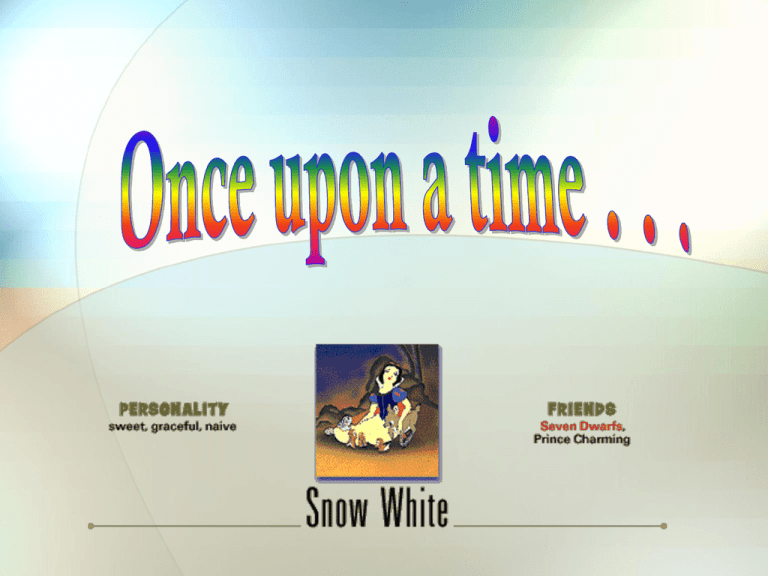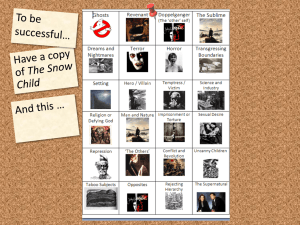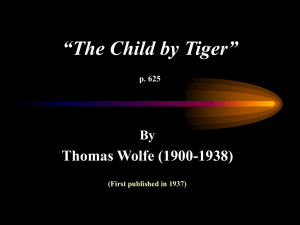SnowWhite
advertisement

Snow White & the Seven Dwarfs A Little History and More Snow White’s Beginnings • Snow White, (in German, Schneewittche, Snowdrop in their first edition) is a fairy tale known from many places in Europe. • The best known version is the one collected by the Brothers Grimm. Snow White in her coffin, Theodor Hosemann, 1852. Snow White’s Beginnings • The German version features elements such as the mirror and the seven dwarfs. • In non-German versions the dwarfs are generally robbers, while the talking mirror is a dialog with the sun or moon. Snow White’s Beginnings In a version from Albania, collected by Johann Georg von Hahn (1864), the main character lives with 40 dragons. The sleep is caused by a ring. The start of the story also has an interesting twist in that a teacher urges the heroine to kill her own mother so that the teacher can take her place. Snow White’s Beginnings The origin of the tale is debated. It is likely no older than the Middle Ages. Many scholars think it originated somewhere in Asia. Once upon a time, a queen was doing needle work while staring outside her window at the beautiful snow. Snow White’s Beginnings It was because of her distracted state that she pricked her finger on her needle and a drop of blood fell on some snow that had fallen on her windowsill. As she looked at the blood on the snow she said to herself, "Oh, how I wish that I had a daughter that had skin white as snow, lips red as blood, and hair black as ebony." Snow White’s Beginnings • Soon after that, the queen gave birth to a baby girl who had skin white as snow, lips red as blood, and hair black as ebony. • They named her Princess Snow White. Snow White’s Beginnings • The queen soon died, perhaps in childbirth. • Soon after, the king took a new wife who was beautiful, but very vain . . . Snow White’s Beginnings In the Brothers Grimm first edition, the villain is Snow White's jealous mother. In another version she does not order a servant to take Snow White to the woods, but takes her there herself to gather flowers and abandons her. It is believed that the change to a stepmother in later editions was to tone down the story for children. Snow White & the Seven Dwarfs • In the Disney version, Snow White wakes from her enchanted sleep as soon as the Prince kisses her, similar to Sleeping Beauty. • The Prince and Snow White have met prior to her enchanted sleep, so he has fallen in love with the awake rather than the sleeping princess, an unusual variation in the Snow White tales. Snow White & the Seven Dwarfs • This version is perhaps the most well known version of the story, and is a classic of the cinema. • This version of Snow White also has a role in the videogame Kingdom Hearts where she is one of the Princesses of Hearts kidnapped by Maleficent. Snow White & the Seven Dwarfs Snow White, although marrying at the end of the tale, is seven when her stepmother tries to kill her. This may be explained by her growing up while in the coffin or during her stay with the dwarves. Snow White & the Seven Dwarfs More often, Snow White is depicted in illustrations as considerably older. One interpretation of the tale is the polarization of women into the evil and active versus the innocent and domestic. • 10th Kingdom, a short TV-series movie, was loosely based on Snow White, as well as many other fairy tales. • HBO's Happily Ever After: Fairy Tales for Every Child, cast Snow White as White Snow, daughter of a native American chieftain. In 1988, ABC released a sitcom based on the home life of Snow White and Prince Charming called “The Charmings." Snow White is one of Princess Fiona's friends in the Shrek movies. She shares an affinity with small woodland creatures with her Disney counterpart. In 1988, the Filmation company produced the first ever sequel to the Snow White tale, originally titled Snow White and the Realm of Doom. Disney feared that it would be mistaken as a direct sequel to their own. Disney filed a lawsuit against Filmation, which lead them to change the title to Happily Ever After. After several years it was later released on video in 1993. SO, whatever happened to Snow White? That is a good question. She appears again in Happily Ever After. The saddest thing is the story’s failure to provide a satisfactory answer about what happened to Snow White. The story takes place a short time after the events of the 1937 Disney masterpiece. Snow White's wedding is approaching, and Lord Malice, the brother of the evil Queen, plans to stop it. Lord Malice transforms himself into a dragon, kidnaps Snow White, and changes her prince into a hideous man. Snow White looks for the Seven Dwarfs, but they are on vacation and have leased their home to their magical cousins, the Dwarfelles. Together they journey to the Realm of Doom where they will defeat Lord Malice and save the prince. • There is another Brothers Grimm tale called Snow White and Rose Red which also includes a character called Snow White. • This Snow White is a completely separate character from the one found in this tale. • The original German names are also different: Schneewittchen (the Princess) and Schneeweißchen (together with Rosenrot). There is actually no difference in the meaning (both mean "snow white"), but the first name is more influenced by the dialects of Low Saxon while the second one is the standard German version, demonstrating a class difference between the two Snow Whites. Snow White & the Seven Dwarfs • First, a 1902 Snow White film was released. • Then a 1916 version with the title Snow White was made. • A 1933 Betty Boop cartoon, Snow White, was adapted from the story, as was the famous 1937 Disney animated feature, Snow White and the Seven Dwarfs. Snow White & the Seven Dwarfs • In 1961, the story was parodied in the film Snow White and the Three Stooges, starring Moe, Howard, Larry Fine, and Joe “Curly-Joe" DeRita. • This film is widely regarded by fans of the Three Stooges as their worst feature film. • In the film, the dwarfs had gone on vacation and lent Moe, Larry, and Curly Joe the use of their cottage. • The comedy-horror-erotic adaptation of Grimm's Fairy Tales, Grimms Märchen von Lüsternen Pärchen (1969), presented Snow White among other characters of Grimm Tales. • A pornographic version of Snow White was released in 1976 in the Xrated animated film Once Upon a Girl. Snow White & the Seven Dwarfs Versions of Snow White have included: • 1987 fantasy film • 1997 fantasy/horror film • 2001 another live action version was made for TV, called Snow White. • Daddy’s Little Bit of Dresden China, a 1988 short film, uses the Snow White story as part of a story of child sexual abuse. Snow White & the Seven Dwarfs All the firsts: • 1937 animated feature • first produced by Walt Disney • first animated feature to become widely successful within the English-speaking world • first to be filmed in Technicolor Snow White & the Seven Dwarfs • premiered on December 21, 1937 • adapted from the old German fairy tale Snow White by the Grimm Brothers Snow White & the Seven Dwarfs • Tenth highest-grossing film of all time within the United States • Ranks 34th in the 100 greatest American films of all tme • Only traditionally animated film on the list Snow White & the Seven Dwarfs • Hollywood movie industry mockingly referred to the film as "Disney's Folly." • It cost just over $1.5 million, a whopping sum for a feature film in 1937. Snow White & the Seven Dwarfs • Disney fought to get the film produced. • His brother and his wife Lillian attempted to talk him out of it. • He had to mortgage his house to finance the film's production. Snow White & the Seven Dwarfs Snow White is looked upon as a triumph of storytelling skill in animation. Names of the Seven Dwarfs Bashful, Doc, Dopey, Grumpy, Happy, Sleepy, and Sneezy were created for this production. Snow White & the Seven Dwarfs Names were chosen from a pool of about 50 suggestions. Keeping track of all seven dwarfs is actually quite simple once you have mastered this simple mnemonic device: two S’s, two D’s, and three emotions. Two S’s: Sleepy and Sneezy; two D’s: Dopey and Doc; and three emotions: Happy, Bashful, and Grumpy. Snow White & the Seven Dwarfs • Walt Disney and his magical dwarfs appeared on the cover of Time magazine. • The New York Times said "Thank you very much, Mr. Disney." Snow White & the Seven Dwarfs Disney's wife, Lillian, told him: "No one's ever gonna pay a dime to see a dwarf picture.“ The audience gave the film a standing ovation at its premier. Did you know? • The movie version of Snow White, along with King Kong, were the favorite movies of Adolf Hitler. • Mathematician and cryptographer Alan Turing was greatly enamored by the story of Snow White and eventually committed suicide by eating a cyanide laced apple. Sources Graphics: • http://disney.go.com/vault/archives/characters/sevendwarfs/sevendwarfs.html • http://disney.go.com/vault/archives/villains/queen/queen.html • http://www.searchforvideo.com/entertainment/animation/cartoon/snow-white/ • http://community.livejournal.com/film_stills/762776.html • http://office.microsoft.com/en-us/clipart/results.aspx?qu=dragons&sc=20#24 • http://www.surlalunefairytales.com/rosered/index.html • http://www.amazon.com/exec/obidos/ASIN/0812558251/thesurlalufairyt Text: • http://arar.essortment.com/sevendwarfsnam_rygj.htm • http://en.wikipedia.org/wiki/Snow_White • http://www.nationalgeographic.com/grimm/index2.html








